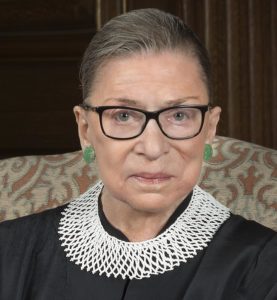About 30 people attend tribute for heroic justice
By Marty Cheek

Justice Ruth Bader Ginsburg
As the nation mourned the death of Ruth Bader Ginsburg, a small group of Morgan Hill residents held a special commemoration of the woman’s extraordinary life the evening of Sunday, Sept. 27.
The Supreme Court Justice died Sept. 18 at the age of 87 of complications of pancreatic cancer. She lay in state under the dome of the Capitol Building in Washington, D.C., Sept. 25, the first woman and first Jewish person to do so.
Vigils and tributes were held across the country, including in the South Valley where about 30 socially-distanced and masked people attended on the lawn in front of the stage at the Downtown Amphitheater. The event was organized by several members of the AAUW and the Young Women Leaders group and broadcast on Facebook Live.
One of the organizers is Morgan Hill resident Sruchi Patel, a film and television major at University of California in Los Angeles. She was impressed with Ginsburg’s devotion to end gender discrimination, a struggle that still continues in America.
“Her appointment to the Supreme Court in 1993 was revolutionary as she continued to fight for gender equality and workers’ rights,” she said.
 In recent years she became a cultural icon known as the notorious RBG, the subject of a documentary film as well as the feature film “On the Basis of Sex,” she said.
In recent years she became a cultural icon known as the notorious RBG, the subject of a documentary film as well as the feature film “On the Basis of Sex,” she said.
“I am grateful for the path RBG paved across our nation as she proved that women can be independent, successful, and strong-minded,” Patel said.
Other speakers at the 30-minute tribute included Morgan Hill Mayor Rich Constantine and Ann Ravel, a former Santa Clara County Counsel. When she worked at the Federal Election Commission, Ravel met Ginsburg at a function. The Justice’s life and character influenced Ravel’s.
When she started in law school in the early 1970s, Ravel was shocked when she learned there were no laws that showed men and women were equal.
“It was sort of a wakeup call,” she said. “Then I learned about RBG and the work she was doing at that very same time with the ACLU. She was doing cases for both men and women because she had the sensibility to know first off that’s a good way to get women’s rights by showing those discrepancies and to make laws that are going to change our entire society — and it has.”
Caitlin Jachimowicz, a local lawyer, was the final speaker at the memorial. She considers Ginsburg a personal hero in shaping her views on justice.
 “There are the ways in which she impacted my life because of the way Justice Ginsburg altered the course of history,” she told people at the gathering. “But before her legendary Supreme Court decisions, lace collars, and fiery dissents, she made life measurably better for myself, my daughter, and all of us.”
“There are the ways in which she impacted my life because of the way Justice Ginsburg altered the course of history,” she told people at the gathering. “But before her legendary Supreme Court decisions, lace collars, and fiery dissents, she made life measurably better for myself, my daughter, and all of us.”
As an attorney in the 1960s and 1970s, Ginsburg’s efforts in arguing gender discrimination cases at the Supreme Court allowed women to obtain bank accounts, mortgages, and credit cards without male co-signers, she said.
“We cannot (now) be fired for becoming pregnant. We don’t need our husband’s permission to get birth control,” she said. “And we cannot be discriminated against when seeking jobs simply because we are female.”
Ginsburg herself faced discrimination as a woman seeking a career in law in the 1950s and 1960s. When she enrolled at Harvard Law School, she was one of nine women in a class of about 500. The dean invited all the female law students including Ginsburg to dinner at his family home. He asked each one: “Why are you at Harvard Law School, taking the place of a man?” When her husband, Marty, took a job in New York City, Ginsburg transferred to Columbia Law School where she became the first woman to serve on two major law reviews: the Harvard Law Review and Columbia Law Review. In 1959, she earned her law degree at Columbia and tied for first in her class.
Because of her gender, no law firm would hire her. Instead, she found a job as a professor at Rutgers University. There, she had to hide her second pregnancy in baggy clothing for fear of losing her job as she wasn’t tenured.
Ginsburg was soft spoken and deeply intellectual. Her power was in her ability to persuade other people not through intimidation but by changing their minds through the use of reasoned arguments, Jachimowicz said.
She helped set the groundwork for invalidating sex discrimination in 270 of the nation’s laws in the groundbreaking case Charles E. Moritz v. Commissioner of Internal Revenue. Arguing the case before the United States Court of Appeals for the Tenth Circuit, Ginsburg convinced the judges that discrimination on the basis of sex constitutes a violation of the Equal Protection Clause of the Constitution.
This case and Ginsburg’s sharp intellect helped convince the Senate to appoint her to the Supreme Court with a vote of 96-3 in August 1993.
“She spoke with respect to people who disagreed with her and she did it in order to change our world,” Jachimowicz said. “She had been wronged. She had been told, quite literally, to give up her seat for a man (at Harvard). But she persisted. And she did it armed with her creativity and her intellect. Can you think of anything more revolutionary today?”






